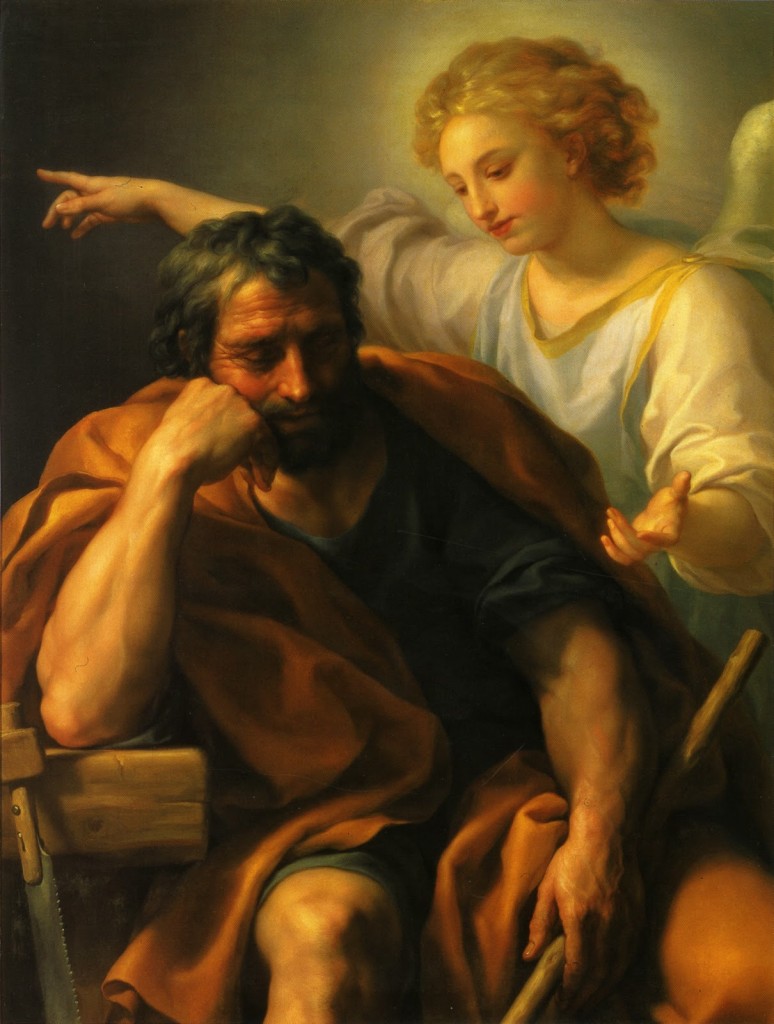The Annunciations to Joseph
Posted On March 19, 2014

A Reflection on the Solemnity of St Joseph,
Husband of Mary
When we hear the word “annunciation,” we tend to think of the annunciation to Mary, when the angel Gabriel announces to her that, of all the women ever created, she is the promised virgin, chosen to give birth to the Messiah, the Son of God. We think of her fiat (Let it be done), whereby she surrendered to God her whole being — her heart, her mind, her body, her soul — and thus participated, in the most unique way imaginable, in the new creation and redemption of the world through her Son. There has never been a more important announcement or a more complete “yes” to God. This was the yes spoken aloud so that it could resound through the universe for all time, the yes spoken not only for herself but for us all, the yes that initiated God’s second creation. In the first creation, God spoke, “Let there be light,” and there was light; and in the second creation, Mary spoke, “Let it be done,” and the Light of the World became flesh.
But, “in the fullness of time,” when God the Father chose to send His Son into the world to fulfill His plan of mercy, He kept His angels pretty busy. Before the annunciation to Mary, Gabriel had also appeared to Zachariah, and later there were various other angelic announcements: to the shepherds, to the Magi, and, in several instances, to Joseph. The accounts of the annunciations to Joseph are especially significant, because they present us with a powerful (and challenging) example. Unlike Mary, Joseph wasn’t being asked to speak aloud on behalf of the world. He wasn’t being asked to participate in a new creation. He was simply being told what God wanted him to do, and his unspoken response is a model for us all. He doesn’t “say” fiat. He says nothing. He simply does exactly what he’s told, immediately and unquestioningly. He is a man whose life “speaks” a complete and unbroken “fiat.” Let’s take a look.
The picture Matthew gives us of Joseph is of a man who always instantly and completely obeys. He doesn’t doubt; he doesn’t question; he simply does exactly what he is told to do, prefiguring his spouse’s later proclamation at Cana, “Do whatever he tells you.” And because of his immediate, unquestioning, and complete obedience, God’s will — as spoken through the prophets—is fulfilled. At Cana, Mary could very accurately have said, “Imitate my husband, Joseph, and do whatever God tells you.”
Jesus told us, “The kingdom of God is within you,” and He told us to pray, “Thy kingdom come, Thy will be done.”
The kingdom of God is indeed within Joseph. In Joseph’s mind and heart, God is King, and he rules there. Joseph, like Mary, is the servant of the King and his fiat, though unspoken, is immediate and complete. Thus, he participates fully in God’s plan. God’s will can be done, because in Joseph His kingdom has come.
Joseph shows us that we are not supposed to merely “say” yes to God, not merely supposed to “pray” the Our Father. God’s will will be done when His kingdom has come in my life—when I have learned to live the Fiat and do whatever God tells me.



